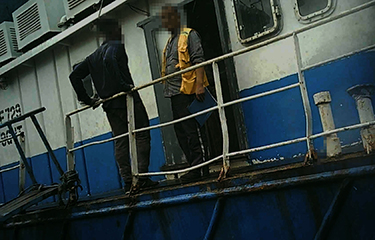Monitoring of illegal trawl fishing activities in Ghana has increasingly become a risky assignment for fisheries observers recruited by the country’s fisheries commission due to increasing incidents of bribery, threats, and abuse at sea, especially on the Chinese-owned, but Ghana-flagged industrial trawlers.
An investigation by the Environmental Justice Foundation (EJF) reveals observers are working in unsafe environments that make it nearly impossible for them to take stock of activity on Chinese-controlled industrial trawlers, including their involvement in saiko. Saiko is a form of illegal fishing where industrial trawlers illegally target small pelagic fish, the staple catch of small-scale canoe fishers, and sell this catch back to coastal communities for profit.
EJF has urged Ghana, which was recently yellow-carded for the second time by the European Commission for failing to take effective steps to end illegal fishing, to safeguard the fisheries observers’ working environment and end “rampant illegal fishing in Ghana’s waters.”
The EJF investigations discovered cases of fisheries observers who had been threatened with metal bars and knives by the Chinese crew, preventing observers from recording fishing activities or documenting violations of regulations by the trawlers.
The mysterious disappearance of one of the fisheries observers in July 2019 – Emmanuel Essien, who was aboard the Chinese-owned vessel Meng Xin 15 – has caused panic and fear among his colleagues, with one telling EJF, “we are raising issues [but] there is no difference at all. Up till now absolutely nothing has been done.”
At the time Essien disappeared, EJF estimates saiko fish made up to 50 percent of the catch on the voyage that he signaled had been engaged in catching undersized fish and in illegal transshipment – forcing him to send a note saying, “I humbly plead with the police to investigate further.”
According to EJF findings, more than 90 percent of Ghana’s industrial fishing fleet is linked to Chinese ownership, despite operating under the Ghanaian flag.
The recruitment of fisheries observers onboard every industrial trawler on Ghana’s waters was previously launched under a USD 55 million (EUR 42.2 million) World Bank project with the objective of enabling collection of data and reporting of illegal fishing activities.
EJ said Ghana’s previous official statements on government commitment to end the saiko fish business have not been followed by action.
“Ghana’s fisheries are at the point of collapse, and the effective monitoring and enforcement of the largely Chinese-owned trawl fleet is desperately needed,” EJF said.
The organization blames the laxity of the Ghanaian government for the now rampant lawlessness and illegal fishing that has placed fisheries observers in harm’s way, as no action is taken on their reports.
“Ghanaian authorities need to act urgently, with determination, ending the threats and bribery and bringing wage structures under government control,” EJF said.
Going forward, the Ghanaian government “must follow up on the multiple reports of illegal fishing, engaging a fair and transparent process to secure prosecutions, convictions, and meaningful deterrent sanctions.”
Photo courtesy of the Environmental Justice Foundation







